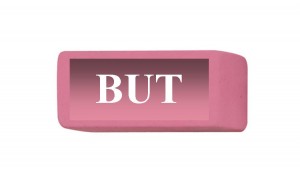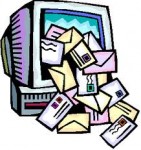The Word “But” – Communicating to Be Heard Corner

Ever hear a compliment, only to be let down when you hear the word “but”? “You’ve been doing a great job with counseling patients lately, BUT let us move more patients through the pharmacy faster.”
Before you hear anything else after “BUT”, you already anticipate to be let down by something negative. It’s what my friend & Communications Expert Kay White calls “The Great Eraser” in her #1 best-selling book “The A to Z of Being Understood: Make Your Voice Heard and Your Conversations Count”.
What if you could change the tone of what you’re about to say by making a simple switch?
Here are two simple tips I learned from Kay to overcome “The Great Eraser:”
 Tip #1: Changing “but” to “and”. A useful way to avoid the “but” trap is to replace it with ”and.” The word “and” works as a bridge, instead of breaking the sentence up and highlighting the negative.
Tip #1: Changing “but” to “and”. A useful way to avoid the “but” trap is to replace it with ”and.” The word “and” works as a bridge, instead of breaking the sentence up and highlighting the negative.
Example: “You’ve been doing a great job with counseling patients lately, and why don’t we move more patients through the pharmacy faster also.”
Tip #2: Flip It – Say the negative part first, and the positive part last. That way the comment is left on a positive note.
Example: We really need to move more patients through the pharmacy faster, but you’ve been doing a great job with counseling patients lately.
 Doing this will make a difference between being heard and having both points received vs. ending a conversation on a negative note. Start watching for The Great Eraser as you counsel patients, talk to co-workers or your pharmacy manager, or even think to yourself—I’ll bet you catch yourself doing it more often than you think.
Doing this will make a difference between being heard and having both points received vs. ending a conversation on a negative note. Start watching for The Great Eraser as you counsel patients, talk to co-workers or your pharmacy manager, or even think to yourself—I’ll bet you catch yourself doing it more often than you think.
It might take a while to get used to pausing before talking to avoid using the word “but,” BUT it is worth it because it will make a huge difference in your communication skills and help you to really be heard in the work place and in your personal life. Comment below on what you think of these tips, or how it’s going for you trying them out.
#1 Reason for Communication Challenges in a Pharmacy
 The #1 communication method that causes misunderstandings in pharmacies is….
The #1 communication method that causes misunderstandings in pharmacies is….
You voted & the results are in from last month’s poll of pharmacy residency directors and pharmacy managers. The most popular answer was email. Face-to-face communication is currently in 2nd place. Do you agree?
What method of communication has caused you the most misunderstandings? If you haven’t voted yet, vote here & see the latest tally so your input is counted.
Tired of emails causing you frustrations with miscommunication? Here are 7 ways to prevent this issue from happening, including when & when not to use email.
Frustrations Communicating with Your Pharmacy Staff
 Co-mmuni-cat-ion. Com-munic-at-ion. I started having a good look at my own communication issues recently when I was feeling frustrated with things falling through the cracks in my pharmacist recruiting business. Some things I envisioned being done a certain way ended up being done a different way. Recently, an email I sent to a team member about a request was interpreted in a different way than I intended & it got us both extremely frustrated. My communication challenges were driving me nuts. There’s nothing I hate more than things impacting the level of service that pharmacists need attention to with their job search.
Co-mmuni-cat-ion. Com-munic-at-ion. I started having a good look at my own communication issues recently when I was feeling frustrated with things falling through the cracks in my pharmacist recruiting business. Some things I envisioned being done a certain way ended up being done a different way. Recently, an email I sent to a team member about a request was interpreted in a different way than I intended & it got us both extremely frustrated. My communication challenges were driving me nuts. There’s nothing I hate more than things impacting the level of service that pharmacists need attention to with their job search.
I was determined to figure out how to solve the challenges I was having. Looking into it, I noticed that sometimes, things I clearly stated one way were being interpreted in another. Then there were times when things I unclearly said were unclearly getting interpreted (imagine that!). If I got lucky, sometimes people read my mind just fine.
I tried to figure out how I could solve the problem, and while doing so, I stayed up all night reading about communication one night. Here are some straight no BS tips I learned (and from my personal experiences) that you can use in your pharmacy/department:
1. Don’t be hard on yourself or on the other person when a communication breakdown happens and you’re frustrated. Realize that communication issues happen when the steps that contribute to communication are skipped. Also, people interpret you from their own “world”, and even if you communicate clearly and they seem to understand exactly as you said, there is still a chance for miscommunication to happen. Take a step back and evaluate what you may have contributed to the issue.
2. Communication = someone expressing themselves + someone interpreting that expression. Happiness for communicator= someone communicating + being understood the way they want. Happiness for recipient= Receiving what was being said + having the info with as little judgment as possible +a way to respond and express their understanding.
3.  No BS lessons/tips to make life easier: Read more
No BS lessons/tips to make life easier: Read more